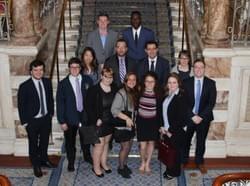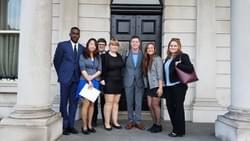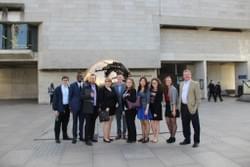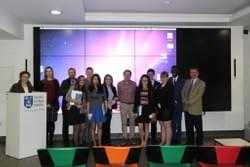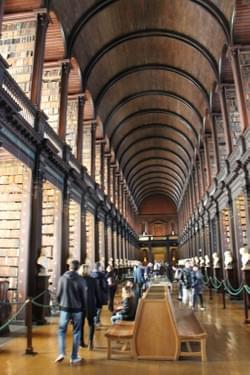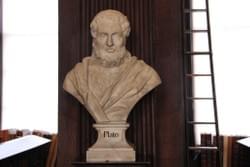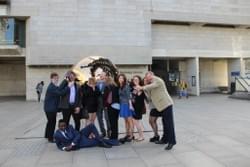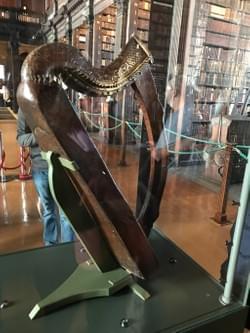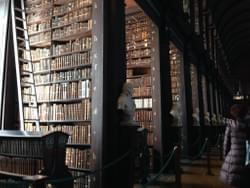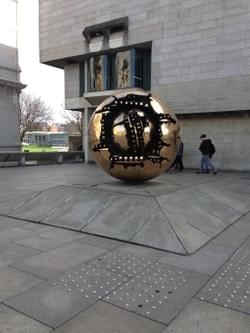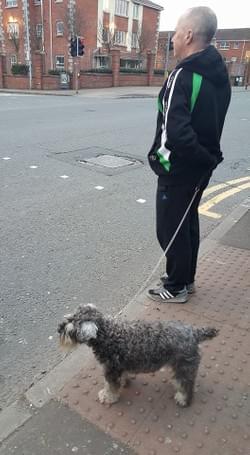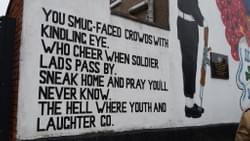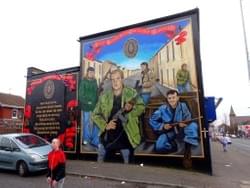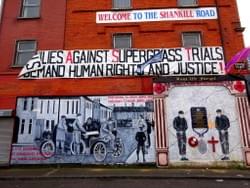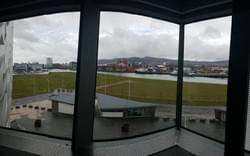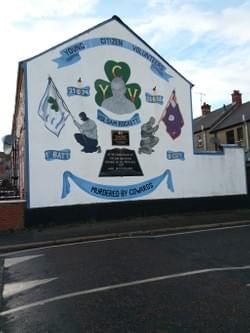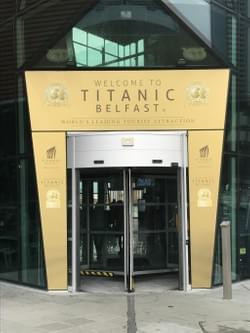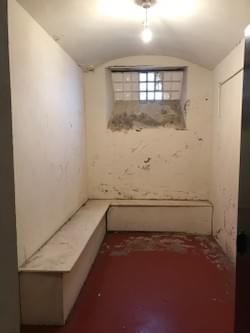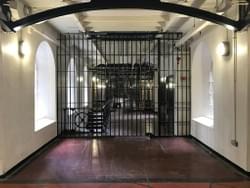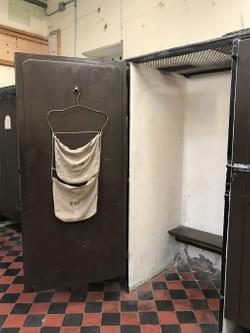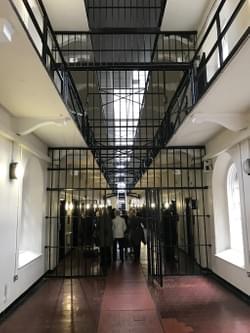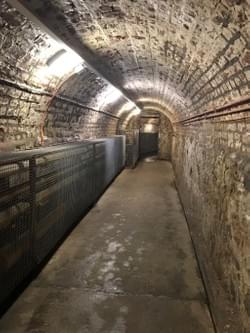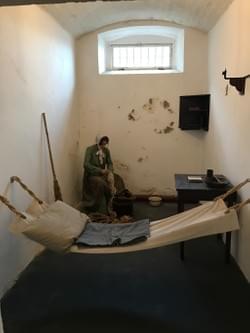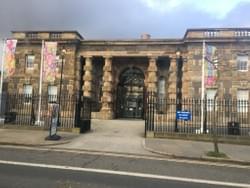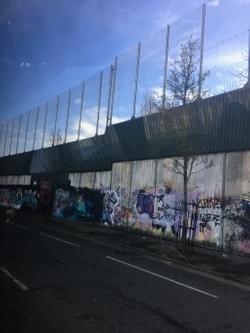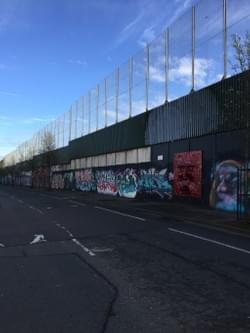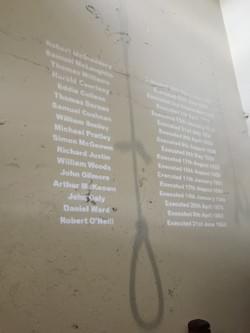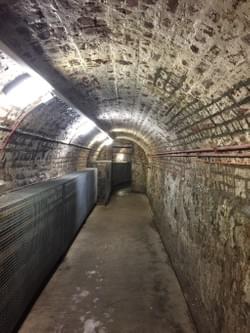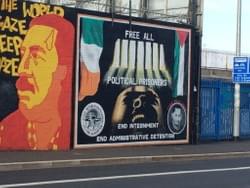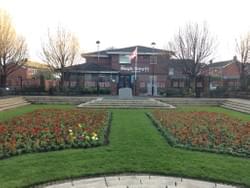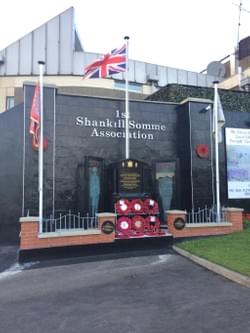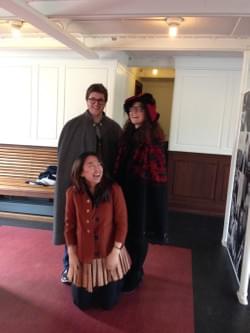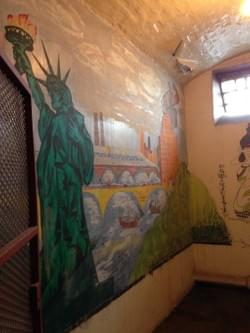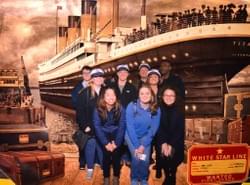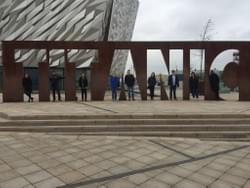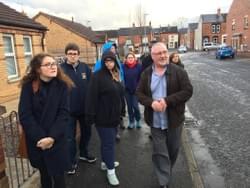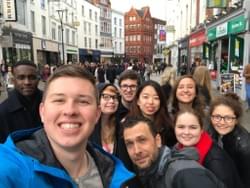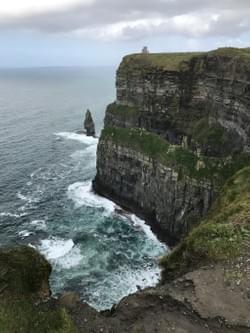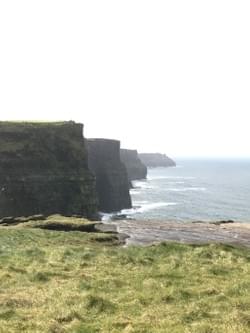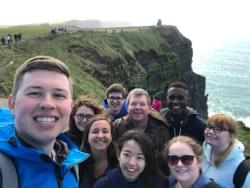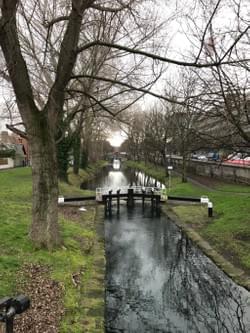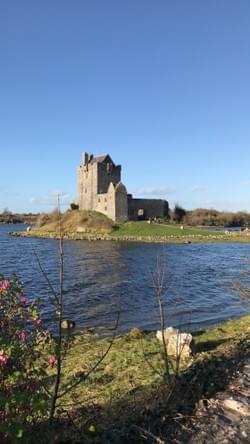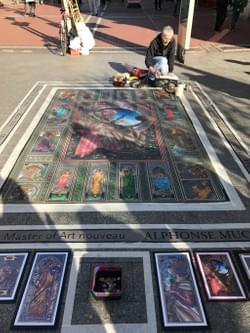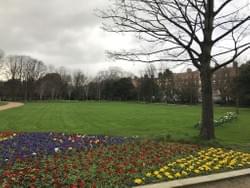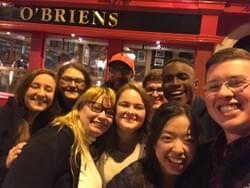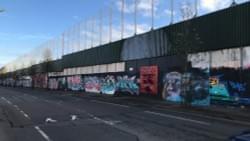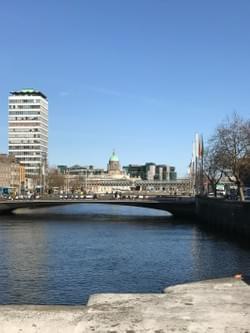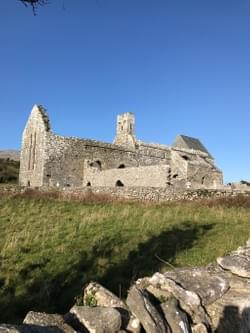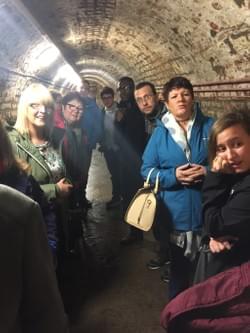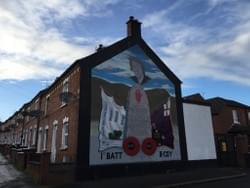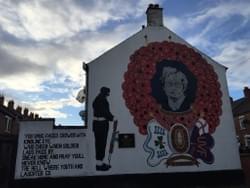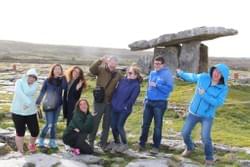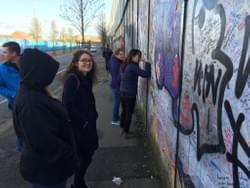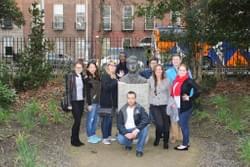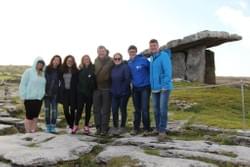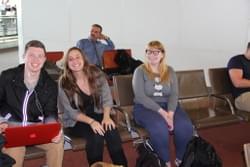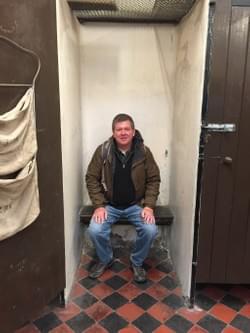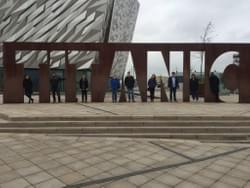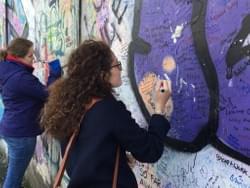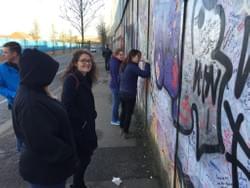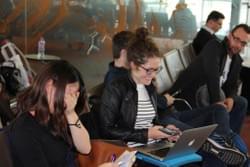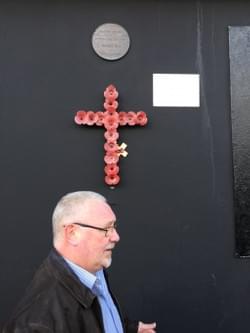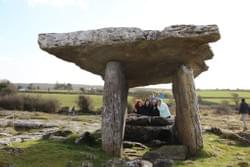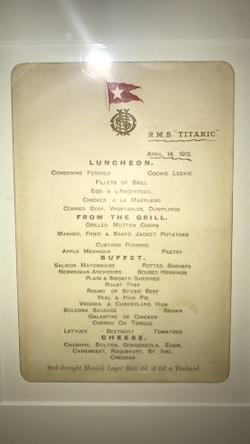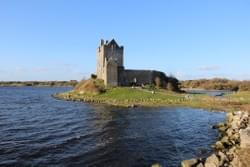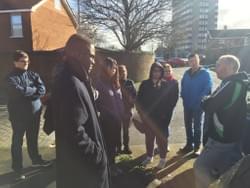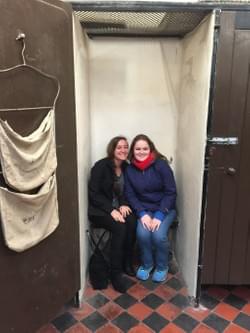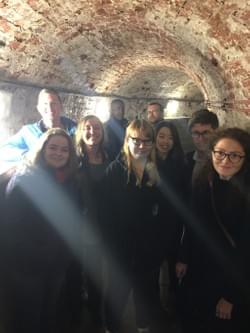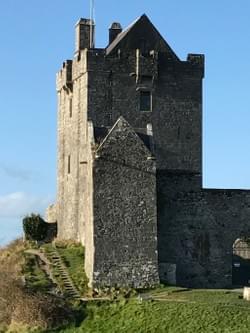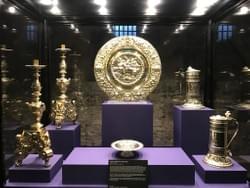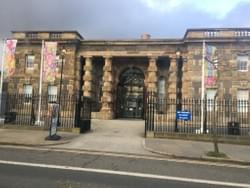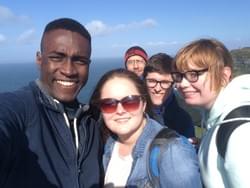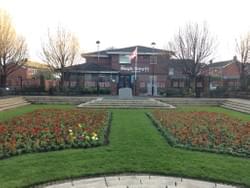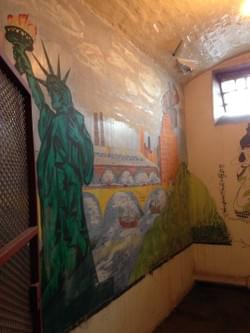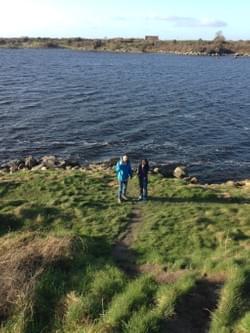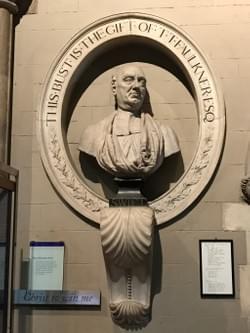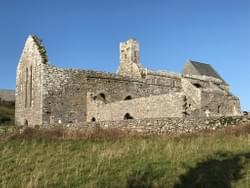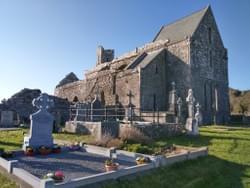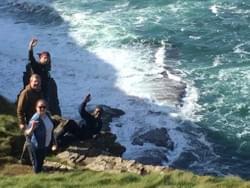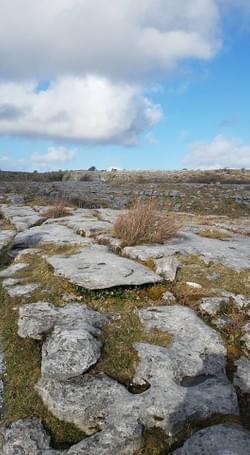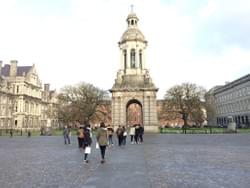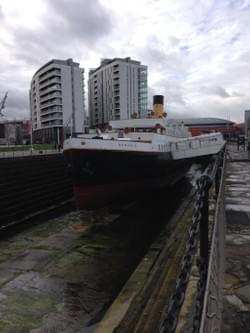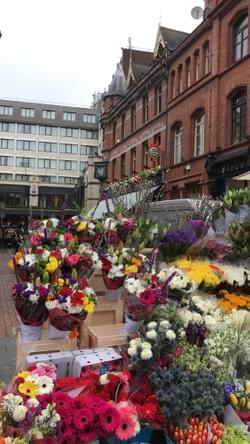
Georgia State University's 2017 Spring Break Course in Ireland
Boom, Bust and... Boom Again?
Department of Foreign Affairs and Trade & Meeting with Paul Gleeson
Kevin F. Remy
2017 has been an interesting year, from the almost surreal, but fascinating, realities of the Trump Administration, to Brexit and the battle between ideologies within Europe. For its part, Ireland has seen a steady rise, growing in both economy as well as political influence within the European continent. President Trump and Taoiseach Enda Kenny agreed on the importance of expanding the already powerful United States-Ireland trade relationship and of identifying new opportunities to collaborate on global issues. This continues the United States-Irish economic and cultural ties, even though the global backdrop is one that is reconsidering all current frameworks.
Mr. Paul Gleeson, former Irish Counsel General in Atlanta, and now the Director of Strategy at the Department of Foreign Affairs and Trade, highlighted some important points to consider regarding global diplomacy and Ireland's place in it. He stated that in regards to the question of economic dislocation and the economic market that “companies want stability and predictability”. It was interesting to note that with Irish foreign policy, that was the best statement to describe its framework. With the growing sentiment of political opinions and emotions of the day that is “political cynicism", the reality is that Ireland has presented itself as a stable global player and provides security and consistency in a world of turbulence. The country also utilizes its global diaspora, yet another strength and soft power tool.
The Irish Department of Foreign Affairs and Trade has cultivated many avenues to approach the tough global stage, but the underlying theme is a pragmatic approach, emphasizing geostrategic realities rather than fixed ideological positions. Upon listening to some remarks made, it was expressed that the approach is a multifaceted one. Said approach relies on bilateralism, the Irish diaspora, neutrality, and the notion that the zero-sum approach has not and does not work for Irish foreign policy.
There are certain global uncertainties that have been silver linings for Ireland. Mr. Gleeson briefly talked about how Brexit might be strategically advantageous to the Irish, as it could remove influential power from London, weakened by its decision to remove itself from the European Union. With the rise of multinational corporations in global politics, Mr. Gleeson could show that Ireland has been a state best prepared with dealing with corporate maneuverability and that there has been a balance of control between government, the market, and the respective communities that are affected by the United Kingdom’s actions. He also talked about Dublin’s niche vis-à-vis other European powers, such as Berlin, Paris, Rome, and Madrid. This was important to note given Ireland now seeks a non-permanent seat in the United Nations Security Council.
This idea of consistency is best expressed in one of the stated strategy positions of the Irish Department of Foreign Affairs and Trade. “Our Place in Europe” has been specified as “to protect and advance Ireland’s values and interests in Europe befitting Ireland’s geographic location outward to the international system". The Irish state and economy have grown to conform to European standards, and Ireland is at an advantage where other states have shown themselves to not be at said standards, or seeking to radically pull away. Through all the noise, confusion, frustration of this time, Ireland has many avenues to succeed. There are issues at home, such as how Ireland will deal with the major influx of individuals and companies moving into Dublin, which faces a housing shortage (there is also a growing conversation about how this will impact the other major cities and gateways within Ireland). But the positives are many. Ireland is a small power that has influence stemming from the power of numbers, such as with the Irish expats and those of Irish heritage in major players like the United States. For Ireland to continue its success, it must rely on not only its ability to adapt to changes in turbulence, but to leverage its stature as a player which can lead.
Trinity College Dublin
KayLynn Kratzer
Georgia State University’s “Ireland: Boom, Bust, Boom…Again?” program covered a wide range of topics throughout its weeks-worth of meetings. From Brexit to the Trump administration to the Troubles of Northern Ireland our discussions centered around the Irish Strategy, the European Political Economy, and how Ireland compares to other countries in various ways. It seemed that many if not all of our meetings reverted back to the discussion of the effect Brexit and the new American administration would have on Ireland. All the meetings added another piece to the Irish puzzle we worked to build and understand throughout the week.
On the first day of the program we met with Dr. Ronan Lyons, a well-known economist based at Trinity College Dublin, to discuss Ireland’s history and how it led to the economic phenomena discussed throughout the course. The topic of the meeting focused mainly on the housing market and how it has fluctuated throughout Ireland’s history in step with the economy. Dr. Lyons argues that the housing market has served as an indicator of economic change throughout Irish history ranging all the way back to the early 1900’s until the present. We also discussed the housing market as a main contributor to the Celtic Tiger boom and subsequent bust in addition to its predictive role today. By following housing market trends, we were able to see a bigger picture of Ireland’s economic history in order to build a foundation for discussions throughout the week.
In addition to our discussion of the housing market in Ireland, Dr. Lyons also gave us some preliminary insights regarding Ireland’s European Union membership and Brexit. He outlined Ireland’s path to development and described the dwarfing effect having England as a neighbor had on it. As a result, many of the decisions made by Ireland during its development were based on what their neighbors can’t or won’t do. A good example of this is their low corporate tax rate that attracted so much foreign direct investment to the island. As the discussion progressed into the topic of Brexit Dr. Lyons expressed the view that it could have both pros and cons. Brexit could work as a vehicle for Ireland to complete its independence socially and economically from England but it could also pose serious economic threats in the future. Overall the discussion with Dr. Lyons served as a good foundational building block for our discussions throughout the program and introduced us to many of the key ideas we would come across in the following meetings throughout the week.
Many of our meetings introduced us to the history of Ireland’s relationship with the European Union while discussing current events that are affecting it today including their membership of the EU and the potential effect of Brexit on Ireland. Some of our meetings also highlighted good things that could potentially come from Brexit as well. Foreign direct investment was also a large part of the discussion in many of the meetings throughout the week. All of these topics exemplify the uncertainty recent global events are bringing to Ireland. Overall, the opportunity to experience this first hand in a foreign country was invaluable and helped to expose me to the more practical application of my course of study. In addition, gaining a global perspective of currents events has significantly impacted my course studies at Georgia State. My main takeaways from Georgia State University’s “Ireland: Boom, Bust, Boom…Again?” program are the prospective repercussions of Brexit and the new Trump administration in areas such as trade, international relations, and macro-economics. Our meetings throughout the week highlighted different areas of concern for the various institutions that we visited. It was an invaluable experience to be able to learn about an economy that is so tied to globalization and the major current events of today.
The Economic and Social Research Institute
Click to see Mr. Kieran McQuinn's presentation to the group!
The Economic and Social Research Institute
Victoria Justice
The Economic and Social Research Institute is a diverse institution that holds members from academia, civil services, state agencies, business, and civil society. At the ESRI they put a great amount of focus on social progress, environmental sustainability, and economic growth. In order to fully understand these different sectors of progress, it is important to examine the macroeconomic aspect of Ireland. This meeting was closely tied with the potential causes of the economic ups and downs, but more interestingly, our host Kieran McQuinn went the most in depth about a recovery strategy. Focusing specifically on one of the contributors to the economic downturn in the early 2000’s, there was a significant amount of banking problems. The domestic market saw a huge boom with a big increase of foreign capital and an increase in lending, especially in the housing sector. This bubble was quite problematic for the Irish economy, and in 2010 Ireland was forced by the European Union to take a bailout from the International Monetary Fund after a dramatic bust. This bailout was humiliating for Ireland since they so recently denied needing any help in the first place. Financial institutions were especially susceptible to problems during the economic downturn and the condition Ireland was facing was nearly impossible to fix on their own.
The Economic and Social Research Institute focuses a great amount on Ireland’s recovery. The Cosmo Model they use is a structural econometric model based on Ireland’s economy. This model is meant to predict medium and long-run economic conditions which is a great help to policy analysis. Policy analysis as well as foreign direct investment are crucial to the well-being of the Irish economy. Furthermore, there was discussion on the strategy of foreign direct investment with Ireland's low corporate tax rate. With this low tax on corporations, the Industrial Development Agency discussed how Ireland is currently the home for the top 10 “Born on the Internet” companies, such as, Facebook, LinkedIn, etc. They also have 9 out of 10 top global pharmaceutical companies, 3 of the 5 top game companies, 50% of the leading financial service firms, and 17 of the 25 leading financial service firms. Ireland is a desirable place of business because of its’ access to the European market, and it also serves as the only English speaking country in the Eurozone. These unique qualities are the reason for Ireland’s high rate of foreign direct investment which is highly regarded when discussing the new boom in Ireland’s economy. However, even with the incredible impact that foreign direct investment has, it is not the only factor in Ireland’s economic growth. A few other economic strategies discussed with Enterprise Ireland pertained to growing exports to the euro zone, improving competitiveness, leadership development, developing entrepreneurship and developing markets. Furthermore, there was discussion at the Trinity College Dublin about how Ireland has always been economically overshadowed by the UK. The potential benefit that arises from Brexit is that Ireland will become less economically dependent. With Brexit Ireland will be the only English-speaking nation in the EU with the world's largest consumer market.
Bord Bia
Click to see David Kennedy's presentation to the group!
Bord Bia
Liz Robisch
The Ireland trip was one of the greatest experiences of my life, and very educational. The main takeaway I got from the trip was that I learned about the reality of what happens when a small nation comprised of a small population with a unique culture attempts to balance acting independently while also having to occasionally rely on others for resources that they can’t provide for themselves. What I learned about their economic strategy was very educational from a political standpoint, and even more reflective of their culture has a whole. To me, many of the conversations we had were proof that politics cannot be considered separate from the interworking of the society in which they represent. The culture of the historically oppressed people who originally built up the government are reflected in their humanitarian focused policies they have established, and those policies have continued to shape a modern culture of primarily progressive individuals.
This liberal general attitude is also influenced by their isolation as a small island. While beneficial in that regard, it unfortunately comes with a few geographical drawbacks– namely Brexit’s impact on their economy due to their reliance on trade with the United Kingdom. Many Irish organizations admitted they were unprepared for this and lacked a backup plan, such as my institution of focus, Bord Bia. It’s still uncertain is if Ireland has the resiliency to recover from Brexit’s impact at a rate that would put them on track to develop economically at the speed they were. Ireland’s economy was looking up after their dramatic crash, and while now they do have other nations to reach out to rely on, their economic losses are already in the millions of euros due to the United Kingdom’s weak pound. Many of their resources they had initially dedicated to the sake of growth may now have to be allocated towards recovery.
Bord Bia, was the most open about the impact Brexit was having on them. The United Kingdom was the primary importer of Ireland’s food and drink products. In only six months since Brexit was first voted on, the weakened pound had cost them almost 600 million euro. When we asked them what their plan for this was, all they could respond with was “panic”. It’s predicted that members of the UK may benefit from these losses and become more independent, while Ireland itself has had no real gains from it so far. Despite these struggles, Bord Bia was and is continuing to take initiatives to expand and root itself in other countries to lessen their reliance on the United Kingdom. They aren’t only doing it for their own economic benefit, either. They are specifically reaching out to countries in need of beef, Ireland’s primary food export, so that they can establish offices in the places that need it most and provide it for them. This furthers my belief that many of Ireland’s economic decisions are done with positive ideals in mind, and that their policies are, overall, based on progressive values.
Overall, Ireland is a nation based on progressive values which have very positively shaped many of their economic and general political strategies. While they were shaping up to be on the rise from their economic depression, Brexit may have done a lot to slow that down. In tradition to their history though, they are continuing forward the best they can, exemplifying the resilience in which their country has relied on for hundreds of years.
IDA Ireland
Click to see Elaine Healy's presentation to the group!
IDA Ireland
Gavin Hall
If I were ever to be asked how important study abroad could be to one’s education, the best response I could give would be to say that it is absolutely crucial. There is no substitute for the hands-on learning experience that you receive by studying abroad. With that being said, the Ireland: Boom, Bust, & Boom Again trip provided the perfect opportunity to learn about Ireland’s robust economy and history, all while immersing myself in its rich culture.
The trip as a whole gave me insight on how a political economy works on a deeper level. The Irish strategy includes a number of tools that the Irish government has utilized in order to stimulate their economy. The most prominent way is by stimulating their business sector. The Industrial Development Agency is and has been at the forefront of Ireland’s battle to stimulate its economy. The IDA promotes Ireland as one of the best places in the world to do business. Their main role is to attract more Foreign Direct Investment into Ireland. Ireland bodes a 12.5% corporate tax rate, is the only English speaking member of the EU, and has a highly educated citizenry, amongst other factors, and it is the IDA’s job to market that. The IDA’s current strategy is entitled “Winning: FDI.” With this goal, they plan on creating 80,000 jobs and gaining 900 new investments lasting from 2015 until 2019. Upon researching the IDA, I have a greater understanding as to why multinational corporations such as Apple and Google are so important for Ireland.
We met with the former Irish ambassador to the United States and Germany at the International Institute of European Affairs. Given his experience, he was able to provide an honest and accurate account of his view on various topics that we had been discussing all week. With Russia being a pressing current issue, I did not find it shocking that he mentioned that Ireland was concerned with Russia’s-European aggressions. The ambassador also stated that unlike the United States, Ireland did not have that much of an illegal immigration problem. He stated that it existed, but it was pale in comparison. We then broached the topic of American Exceptionalism. He expressed his thoughts that U.S. leadership was very much alive and sought after even though we may not see that as often here in the US.
Towards the closure of our trip, we met with Paul Gleeson. He is an Irish civil service employee and a former Irish Consul General in Atlanta, GA. Again, given that he is an Irish citizen and has worked closely with America, he was able provide an uncommon perspective. A fellow student asked if the United States had lost its gloss, and he stated that people were actually “obsessed” with what goes on here. We also discussed the Irish “Plan B” for Brexit and he stated that “governments do not really admit to Plan B’s because that causes uncertainty.” Instead, they focus on directing people to believe that things will go as planned. Given no set topic for this meeting, it provided us a chance to tie up loose ends with questions that we had thought of all week.
In summation, the Ireland: Boom, Bust, and Boom Again trip provided me the chance to really solidify the major in which I have chosen to study. It offered me the chance to experience another culture and immerse myself in experiential learning. Looking forward, having the knowledge of the Irish history and riotous economic past provides a solid ground on which to compare other governments and economies in my future studies.
US Embassy
US Embassy
Daniel White
Our visit to the United States Embassy was unique in that it offered an American perspective to all the topics that had been discussed up to this point. What made this meeting particularly important was the fact that we were meeting with commercial officers, both of whom are Irish nationals, but who make a living representing the commercial interests of the United States. Their perspective was unique, because although they live in Ireland, and certainly benefit from the economic development that Ireland has pursued, the focus of their work is to promote US industry. This creates a difficult balancing game with many of the agencies we met with. On the one hand, working together can promote both group’s interests, on the other promoting the commerce of the US may mean trying to beat Irish companies.
The role of the US commercial officers is to promote US business abroad, and to attract investment into the United States. Although this is similar to the role that IDA Ireland and Enterprise Ireland play, the role of the commercial officers requires a more delicate balance. Part of the reason Ireland has been so successful with globalization is the fact that Ireland is largely incapable of being successful without it. Ireland is small and does not have the population to sustain a diverse array of heavy manufacturing industry. The same is not true of the United States. While it is certainly true that the United States cannot operate in a vacuum, it is also true that the United States is home to numerous companies that could be in direct competition with Irish competitors.
Another issue to consider is perhaps the most critical point of the Irish strategy, the low corporate tax rate. The majority of companies that have taken advantage of this low tax rate are American firms. This means that the US is directly losing tax revenue from Ireland’s taxation policy. How does the US balance this loss with the desire to be global? If you are President Trump, there is not balance at all, these companies are hurting America, and need to bring their profits home. Moreover, while there will of course be benefits to US firms investing in Ireland, one perspective, certainly for someone with limited knowledge of economics, would be that money spent in Ireland is money not spent in the US. Again, in a vacuum it may be fine to ignore such complaints and do what is best for the overall economy. In reality, the President and Congress must respond to the demands of people, sometimes no matter how ridiculous they are. In discussing this point, we were told that the commercial officers try to remain above the political fray. Even if some changes happen politically, they largely continue to push forward with promoting US exports, and attracting investment into the United States. Both of our speakers felt that attempting to change with the political winds is sometimes necessary, but they also must keep their head down and simply continue with their jobs.
Enterprise Ireland
Click to see Alexa Toomey's presentation to the group!
Enterprise Ireland
Stephanie Umezaki-Oba
The trip to Ireland over this past Spring break allowed us to study their culture and political economy, focusing particularly on the last century since it gained its independence from the United Kingdom. Going into the trip, there was not too much that I knew about Ireland. In all honesty, most
of my knowledge regarding Ireland and the United Kingdom before being accepted into the study abroad program was based off BBC television.
Enterprise Ireland is the organization which helps Irish businesses expand internationally. Their main function is to “Start, Innovate, Scale, and Anticipate.” They do this through a variety of programs, giving businesses assistance with finding funding, advice, and information relevant to their business. Although most of their assistance goes to the agricultural sector, Enterprise Ireland is currently trying to recruit from other fields, especially the fintech service companies.
Enterprise Ireland is extremely relevant in political economy currently due to the turmoil and uncertainty caused by Brexit. After the referendum passed in the U.K., they published a new program to help their current customers understand how Brexit will affect their markets. It also encouraged entrepreneurs to consider expanding their markets past the U.K. into other countries still in the Eurozone as well as targeting the U.S. However, these efforts will prove to be a challenge because most Irish businesses have traditionally expanded their businesses to their close neighbor first, and encouraging new entrepreneurs to push towards more unfamiliar markets will be difficult.
They have also published a new strategy system for 2017-2020 which focuses on scale and expanding reach. This includes a greater investment into research and design as well as mentoring programs to ensure constant improvement and readily pass on information. They also plan to push Lean programs (which basically look to improve efficiency and effectiveness) and encourage Irish businesses to consider going international.
However, the meeting with Alexa, Claire, and Sean took a turn into studying the effects of Brexit not only on businesses but on the people within Scotland, Northern Ireland, and the Irish Republic. (They are from Dublin, Northern Ireland, and Scotland, respectively.) The decision for Brexit causes tensions within Scotland, and between the Irish Republic and Northern Ireland.
Due to Brexit, the Scottish people are considering leaving the U.K. in an effort to remain a part of the European Union. (However, even if Scotland leaves, they must reapply to join the EU.) The chance of a Scottish referendum is increasing, and now with the official announcement of Brexit, there may be a chance for Scottish independence, but Sean did not believe his people have the confidence to govern themselves.
Meanwhile, Claire voiced concerns of physical borders being placed between Northern Ireland and Ireland. Should borders become enforced, the island would be split in two, ruining the reunification process. This would negatively impact products like Bailey’s which cross over the border several times in terms of efficiency, but also brings into question the validity of the Good Friday agreement which may or may not stand after Brexit. In addition, workers who travel from one side to the other for their jobs could have a more difficult daily commute.
Lastly, Alexa, a Dublin native, admitted perhaps Northern Ireland was more invested in the reunification effort because Ireland is too busy anticipating the economic losses. (Also perhaps because Northern Ireland may be considered a burden by both Ireland and the U.K.) All in all, it was a fascinating meeting at Enterprise Ireland and we walked away with much more “inside” knowledge than before.
The Institute of International and European Affairs
The Institute of International and European Affairs
Kevin Friend
Ireland is a country filled with natural beauty and some of the friendliest people you will ever meet. I got to know this firsthand because of the opportunity to study over spring break in Dublin. The group I traveled with was an eclectic bunch and some of the brightest students I have had the pleasure of studying with. The trip fit in so perfectly with my major, political science, because the topics discussed at each meeting were tied into political issues facing Europe today, lessons learned from the past, and lessons that have yet to be learned and doomed to be repeated.
Everything we did as a group had an amazing lesson behind it and every person we met was someone that made the Irish economy work. Everyone was so cordial and the entities that hosted us were beyond welcoming. There was a level of anxiety every place we went because we were there at a historical time. Brexit was about to happen and no one knew just how damaging this event would be on Ireland, but they knew it wouldn’t be good. We all had our institutes or groups to study up on and I was no different. Mine was quite amazing.
I had the distinct pleasure of heading the IIEA (Institute of International European Affairs) meeting. Through my research, I learned that this institute is a think tank that takes on everything from trade to conflict. The guest speaker, Ambassador Fahey, was delightful and spoke to on a wide range of topics; everything from American exceptionalism, Brexit, Northern Ireland, and Russian aggression in Eastern Europe. Ambassador Fahey was the Ambassador to the United States for Ireland. The discussion was long and detailed but so interesting that it seemed to fly by. The building itself was somewhat awkward; it was in the middle of row homes in Dublin that did not look too impressive from the outside, but on the inside, it had the feel of an old southern Victorian style home with a grand chandelier and high ceilings. They served us a delicious lunch with tea, coffee, and water to drink. The hospitality was immense and they lived up to the friendliness described earlier. The trip was an adventure I will always cherish. I hope to never lose contact with the people I shared the experience with and retain most of the knowledge obtained on the trip.
Belfast, Northern Ireland
Renee van Amburgh
The Ireland Boom Bust and Boom Again study abroad program was central in reconstructing my understanding of the Irish experience. Despite an immense and diverse diaspora, Ireland is often portrayed as somewhat of a “single story:” Catholic, rural and red-headed. Our time spent in Dublin challenged many of these stereotypes. Dublin is a sprawling urban metropolis with a Washington D.C. vibe, massive new infrastructure, and a vibrant pub scene. The streets were neither lined with cows nor red-heads (which as we learned at IDA only make up about 10% of the population), but with tourists, businesses, new construction, and historic landmarks. It would be unfair, of course, to say that all my prior knowledge of Ireland should be dismissed, especially considering that on the first day of our visit we saw a man riding atop a leprechaun chariot through Saint Stephen’s Green; but this particular instance was probably abnormal for even the Irish. Aside from that particular occurrence, our government visits and excursions presented us with a comprehensive understanding of Ireland, Irish culture, and Irish interests. Each day of the trip focused on different elements of the Irish experience, from scenery and geography, to agriculture, to foreign policy, to domestic policy—all painting a picture of Ireland’s long journey for independence, self-sustainment, and economic growth.
Each day of our trip focused on a different element of the Irish experience. We began our trip with an excursion to western Ireland where we visited The Burren and the Cliffs of Moher. By traveling outside the city, we were able to appreciate the agricultural roots of Ireland that continue to play a role in Irish culture, society, and economics today. As we progressed through the week of meetings, we learned about the “romanticism of the farm,” as the Bord Bia representative observed, that remains present even in the face of changing economic and social factors across the Irish state. We learned that Ireland’s growing cosmopolitanism is not at odds with rural life in Ireland, and as urbanity expands across the country, the rural areas remain central to Irish story—in Irish pride for their geography, history, and national products (which even with the boom in technology and pharma are primarily food-based). The Republic has demonstrated its resiliency during its periods of economic and social change: it’s booms, busts, and, now, boom again. In Dublin, the legacy of the Celtic Tiger and FDI-favorable taxation policy has made Ireland a hub for international development and tourism while the city also posits itself a bastion of liberalism and acceptance.
The cosmopolitan, liberal ideologies that have been growing in Ireland since the Celtic Tiger are only now emerging in British-controlled Northern Ireland (also known as “Ulster”). On the sixth day of our trip, we traveled to Northern Ireland to visit the Titanic Museum, Crumlin Jail, and tour the Catholic and Protestant neighborhoods of The Falls and Shankill, respectively, with former political prisoners from opposing sides of the civil conflict known as “The Troubles.” The Troubles spelled economic and social turmoil in the North while competing identities and ideologies clashed, dividing neighborhoods, fostering nationalism, and bringing about a 40-year conflict that undermined opportunity for economic development and investment.
The brutality of the conflict is still felt today and its weight is carried by the people of Belfast. The IRA-Republican-Unionist-Catholic and UVF-British-Loyalist-Protestant factions maintain divergent histories concerning the nature of the conflict. Former political prisoners led us through the history of the conflict as we toured Belfast’s Protestant and Catholic neighborhoods and viewed the Peace Walls’ colorful and politically-charged murals. It was hardly surprising that each group drew a comparison between their cause and that of other divided states, in particular, Israel. The Falls neighborhood featured a pro-Palestinian mural sympathizing their mutual struggle for nationhood against an oppressive state. Meanwhile, homes in the Shankill donned Israeli flags and paid homage to the “innocent” protectors among their faction. The question of religious and ideological superiority exists in a way that draws a sharp contrast to Northern Ireland’s southern neighbor. In fact, when asked about the concept of a United Ireland, a Northern Irish woman at Enterprise Ireland seemed unconvinced that the integration would be smooth process because republican forces in the north have such strong nationalist fervor that contradicts with how modern-day Ireland conceptualizes itself (though, hypothetically, she noted that the idea of a “United Ireland” would be desirable). Further, Irish politicians take pride in the absence of a far-right, nationalist party in the state, and introduction of Northern Irish nationalism could pose a problem to the ideological makeup of the Irish Republic.
Northern Ireland, much like the Republic of Ireland is changing. Brexit, the “British Exit” from the European Union, has brought about new concerns and challenges; and, despite the “panic” that has ensued, there is hope for recovery, reconciliation, and further growth for the republic. Northern Ireland is also on the road for change, as they approach the 20-year anniversary of the Good Friday agreement, there have been decisive steps for economic growth and political change within the country. Brexit, of course, has exacerbated some ideological concerns among the Loyalist and Unionist groups; but there seems to be changing perceptions (although such changes have been small) about the nature of the conflict, and the opportunity to work together, live together, and collaborate across religious and ideological lines. As we enter into a new era of European relations, Irish growth, and Irish identity, there are important questions for Northern Ireland as well: will Northern Ireland see rapprochement among sharply divided factions? And, like its southern Neighbor, will Northern Ireland have a change to “boom again?”
Gallery of Our Adventure

